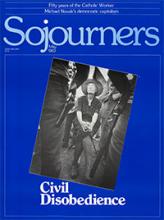One day while I was at work in the U.S., I got a call from a man who said he had been appointed my parole officer. He had not given anything but his name in identifying himself at the switchboard, and he assured me that he was being careful "not to reveal" to my employer the fact that I had "a criminal record."
I was impressed by the personal concern the man obviously had for his clients, but I couldn't help laughing. I explained, "In my case, there is nothing to worry abouteveryone here knows. In fact there is a picture of the 'crime' over my desk and another in the hallway of my home."
The parole officer, who later came to visit, continuously shook his head while with me. He kept saying, "I don't think I've ever seen anything like this before."
Though that year on parole is long over and I am now living in Holland, the photograph is still over my desk. It occasionally still surprises visitors who have nothing to do with the peace movement. The photo shows a group of 14 people, about half in priestly black suits, having a prayer service around a huge bonfire. We were burning files of the nine draft boards serving the city of Milwaukee, an event that took place September 24, 1968. That action resulted in our imprisonment. It was the sixth experience of imprisonment for me, and the longest - about 13 months.
"Do you regret any of it?" a visitor asked recently. "No, not a bit." In fact that last stretch in prison, though it was hard on some other people important to me, was for me mainly a time of recovery and deepening my life, praying more, reading things I hadn't had time for.
Read the Full Article

